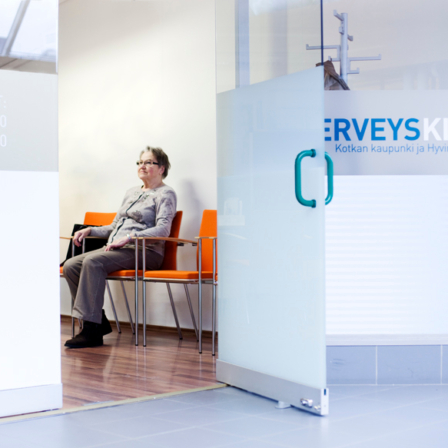The Finnish system of funding health and social services is complicated.
The health and social services reform that has been in the making for a long time aims to simplify things, but the work is still in progress as of February 2019. Because money is a powerful guiding factor, the upsides and downsides of the current system look different, depending on one’s perspective.
Therefore, we would like to challenge you to review the management of social and healthcare services from several points of view.
Imagine being the head of a hospital district, a regional health authority. You are responsible for specialist medical care in your district: responsible for those who are severely ill and need to be treated as well as possible; for employees to enable them to do their job well; and for keeping finances under control.
“You know that your hospitals are providing high-quality care to people.”
The money, however, is not actually yours, but received from the municipal areas making up the hospital district. Because it is your task to ensure the best possible care, in practice the system has become such that when you run out of money, you ask the financial department to send additional invoices to the municipalities. The municipalities complain but have no other option but to pay.
You are satisfied. You know that your hospitals are providing high-quality care to people, in accordance with evidence-based recommendations and even relatively cost-efficiently. You have done your job well.
Well, that’s great! But would you cope equally well in the private sector, say, as the CEO of a company providing health services?
“You won’t make it that easy”
You are running a business that is slightly more regulated than most other lines of business. In addition, you are dealing with people’s health and life, very sensitive things. This means that you won’t make it that easy.
Fortunately, your company provides occupational healthcare services besides other services. As long as you manage the agreement negotiations and the customer after-care service well, you will get a lot of money from employers, and partly from Kela, for treating quite a healthy and functionally capable group of people who are mostly satisfied, as long as they have easy access to a doctor.
In addition, you are very likely to gain access to a new market within the next few years, with the reform of the Finnish health and social services system.
“And boy, you are beginning to sweat!”
You know that it will require a slightly new kind of a mindset and new business models from you, because the buyers – the counties which organise primary care – want to prevent your company and competitors from milking money for nothing or something unnecessary, at least through regulations and agreements.
However, you see this more as an opportunity than a threat, as you believe that you can treat an entire population cost-efficiently so that people remain healthy, diseases are treated and, in addition the society and the owner also gets their own share.
You also estimate that if the health and social services reform still doesn’t pass but the preparations continue from a new basis under the new government, you can create new demand and attract new customers by offering new kinds of services. People are worried about their health and trust private services. More and more people are also insured, which will only provide you with more customers.
So, it went quite well again! Now, we are appointing you as a municipality’s health and social services director.
And boy, you are beginning to sweat!
Cautious about the county reform
Because you tend to perceive things via the big picture, you can clearly see that you are unable to control the tax money as efficiently as you would prefer. It seems that the hospital district has the right to use the tax funds collected by your municipality over the civil servants and politicians – the invoices for specialist healthcare must be paid.
You do know that the hospitals are doing a good job, and you would not want to transfer the treatment of, say, children with cancer hundreds of kilometres away. It would not seem humane.
However, at the same time, you can clearly see that primary care tends to have too few resources. Specialist healthcare is expensive. Therefore, there are not as many resources for health centres as there should be to ideally take care of the population’s health even when their ailments do not fall within the scope of specialist healthcare.
Not to even mention that incredible improvements could be achieved in social services even with small amounts. That is, if the money were only there.
“Is it possible to find politicians who truly understand the complicated system of health and social services?”
There is caution about the pending county reform. You are used to the management of health and social services being somewhat civil servant-driven. Committees do not tend to draw up policies; that is up to you, your team and your colleagues in neighbouring areas. To your mind, this works quite well, as trustees appointed on political grounds lack expertise in health and social services.
However, you can clearly see that one of the objectives of the health and social services reform is to transfer power to the county level, and even to the political decision-makers of the counties.
Is it possible to find politicians who truly understand the complicated system of health and social services?
Where will your town’s elderly citizens be treated – close to home or on the opposite side of the county?
You have made up your mind on one thing. If the implementation of the health and social services reform is again postponed beyond spring 2019, you will begin to strongly push forward a solution whereby the primary care of the municipality is outsourced as a whole to a sensible service provider.
You believe that you can better guide an external service provider than your own local health centre. It is possible to include many more numerous, more transparent and more efficient clauses in an outsourced service provider’s agreement than the management of your own health centre can be induced to accept.
And that was quite a tough nut to crack. But hey, congratulations – in the end, you will get to be the chair of the county board! In addition, the regional government and health and social services reform pending in early 2019 is about to be realised.
“You are now holding the tools to change this situation”
As the chair of the county board, you have power. After all, the reason for the entire reform is to take care of health and social services, which consume a large share of tax money, more clearly and transparently.
The idea is to separate the organisation and production, thereby ensuring that the one with the budget – the organiser – makes the decision on the use of resources.
So far, the provider has been able to specify their own resources, especially in specialist medical care. This inevitably causes distortions in the control of resources: the most imposing procedures and best lobbyists often get more money than they deserve, with treatments becoming more expensive, wages going up, the population getting older and people’s demands increasing.
You are now holding the tools to change this situation. According to the rules of democracy, you, the elected officials decide on the health and social services policy of your county.
“In addition to expertise, you and your partners will need excellent tolerance of pressure.”
If you want to increase the funding of elderly care, for example, you may begin to negotiate with your neighbouring municipality over whether part of the most expensive specialist medical care could be managed jointly to save money. At the same time, expertise would be centralised, which might also lead to better outcomes.
But it will not be easy. You had better hope that, in addition to you, the county board and council, as well as the civil servants, will include people with strong expertise and the ability to simultaneously understand people’s needs and the complicated system of health and social services in which even a small change in some respect may cause unforeseen side effects in a dozen other places.
In addition to expertise, you and your partners will need excellent tolerance of pressure. There will be lots of lobbyists, and they will be presenting heartbreaking arguments: would you prefer to leave small premature babies or chronic schizophrenics without care?
And what if the structural reform doesn’t materialise?
In the middle of all of this, you should keep in mind that in the end, you will have more power than almost anyone has had in ages as an organiser of health and social services in Finland. You can steer with money and, in complicated systems, money is usually the most effective driver.
And what if the structural reform doesn’t materialise? Well, then the money will go to different destinations in the public and private sectors without clear guidance, as it has done until this point. Those who get to keep their power may be satisfied for a while, but soon it will become clear that some sort of reform has to be made sooner or later for the use of resources to be sufficiently efficient.
And you can be certain about one thing: the funding system is also guaranteed to be used as the means of control at that time. Money is power.
Antti Kivelä, Director of the Capacity for Renewal theme and Lea Konttinen, Senior Lead of the health and social services funding team at Sitra and Timo Aronkytö, Leader of Change, Health and Social Care Reform at the Helsinki-Uusimaa Regional Council were interviewed for this article.
Sitra has been working for the reform of social and healthcare funding through several projects and initiatives since 2010, when the Kansallinen tilaaja-rahoittajamalli (Katira) model was published. Helsingin Sanomat newspaper (5 June 2010) promptly described the model as the “most realistic utopia for a long time” in its editorial.















Read more